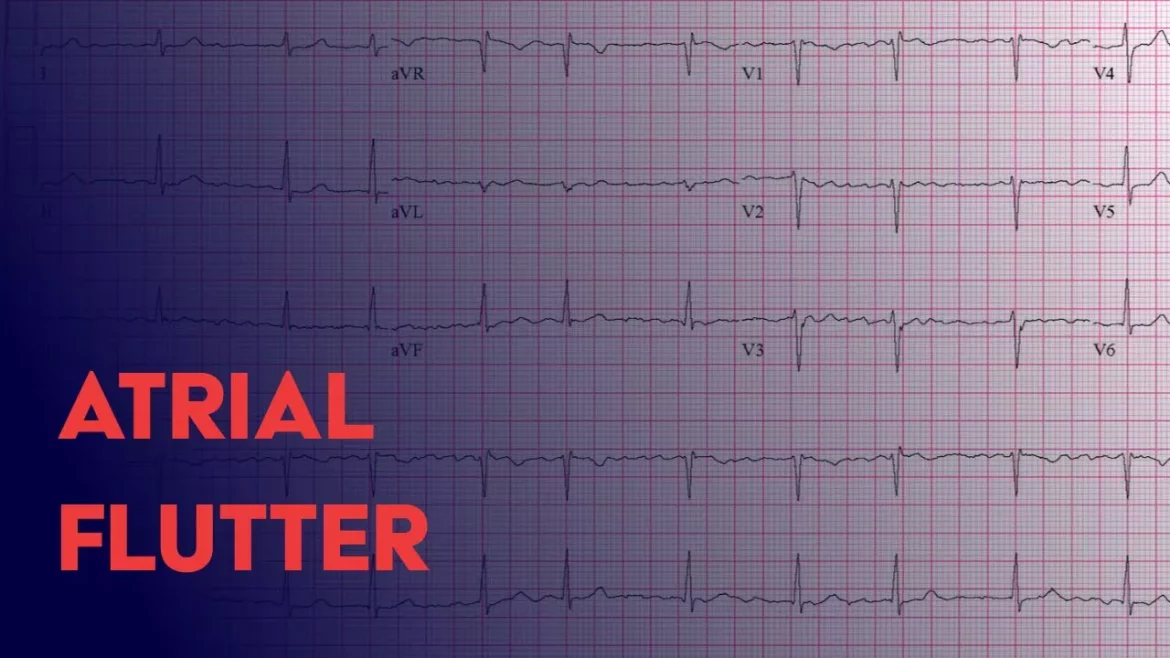Atrial flutter is a type of abnormal heart rhythm, also known as an arrhythmia, that affects the upper chambers of the heart, called the atria. In atrial flutter, the electrical signals that coordinate the heartbeats become disorganized, leading to a rapid and often irregular heartbeat. This condition can have significant implications for cardiovascular health and requires careful management and treatment. In this article, we will explore the characteristics, causes, symptoms, diagnosis, and treatment options for atrial flutter.
What Is Atrial Flutter?
Atrial flutter is characterized by rapid and regular electrical impulses in the atria, typically occurring at rates between 250 to 350 beats per minute. Unlike atrial fibrillation, another common atrial arrhythmia, atrial flutter is characterized by a more organized electrical activity, often in a sawtooth pattern on electrocardiogram (ECG) readings.
see also: 5 Causes of Paroxysmal Atrial Fibrillation
Causes of Atrial Flutter
Atrial flutter can occur due to various underlying causes and risk factors. These may include:
Heart Disease: Conditions such as coronary artery disease, heart valve disorders, cardiomyopathy, and congenital heart defects can increase the risk of atrial flutter.
Age: Atrial flutter is more common in older adults, especially those over the age of 60.
Hypertension: High blood pressure can contribute to the development of atrial flutter.
Thyroid Disorders: Thyroid imbalances, such as hyperthyroidism, can affect heart rhythm.
Electrolyte Imbalances: Abnormal levels of potassium, magnesium, or calcium in the blood can disrupt heart function.
Alcohol and Stimulant Use: Excessive alcohol consumption and stimulant drugs can trigger atrial flutter episodes.
Previous Heart Surgery: Individuals who have undergone heart surgeries may be at increased risk.
Obesity: Being overweight or obese can contribute to atrial flutter and other heart rhythm disorders.
Symptoms of Atrial Flutter
The symptoms of atrial flutter can vary depending on the individual and the rate at which the arrhythmia occurs. Common symptoms may include:
Palpitations: Sensations of rapid, fluttering, or pounding heartbeat.
Shortness of Breath: Difficulty breathing, especially during physical activity or exertion.
Fatigue: Feeling tired or lacking energy, even with normal daily activities.
Dizziness or Lightheadedness: Sensations of feeling faint or dizzy.
Chest Discomfort: Some individuals may experience chest pain or discomfort.
Syncope: Fainting or near-fainting episodes may occur in severe cases.
It’s essential to note that some individuals with atrial flutter may not experience any noticeable symptoms, especially if the heart rate remains relatively controlled.
Diagnosis of Atrial Flutter
Diagnosing atrial flutter typically involves a combination of medical history review, physical examination, and diagnostic tests. These may include:
Electrocardiogram (ECG): A standard ECG can detect the characteristic sawtooth pattern of atrial flutter.
Holter Monitor: This portable device records heart rhythm over a period of 24 to 48 hours, providing more extended monitoring for arrhythmias.
Event Monitor: Similar to a Holter monitor but worn for a more extended period, an event monitor records heart rhythm when symptoms occur.
Echocardiogram: This imaging test uses sound waves to create a detailed picture of the heart’s structure and function, helping identify underlying heart conditions.
Electrophysiology Study (EPS): Invasive testing may be necessary in some cases to assess the heart’s electrical system and identify specific areas causing arrhythmias.
Treatment Options for Atrial Flutter
The management of atrial flutter aims to control symptoms, prevent complications such as stroke, and restore normal heart rhythm when possible. Treatment options may include:
Medications:
Antiarrhythmic Drugs: These medications help regulate heart rhythm and prevent arrhythmia episodes.
Rate Control Drugs: Medications such as beta-blockers and calcium channel blockers can slow the heart rate in atrial flutter.
Anticoagulants (Blood Thinners): To reduce the risk of blood clots and stroke, especially in individuals with atrial flutter and additional risk factors.
Cardioversion:
Electrical Cardioversion: A controlled electrical shock is delivered to the heart to restore normal rhythm.
Chemical Cardioversion: Intravenous medications may be used to convert atrial flutter to normal sinus rhythm.
Catheter Ablation:
Radiofrequency Ablation: A minimally invasive procedure where catheters are used to target and destroy abnormal heart tissue causing arrhythmias.
Implantable Devices:
Pacemakers: In some cases, a pacemaker may be implanted to regulate heart rate and rhythm.
Implantable Cardioverter-Defibrillators (ICDs): These devices can monitor heart rhythm and deliver shocks or pacing as needed to correct arrhythmias.
Lifestyle Modifications:
Healthy Diet: A balanced diet low in saturated fats, cholesterol,and sodium can support heart health.
Regular Exercise: Physical activity, as recommended by healthcare providers, can improve cardiovascular fitness.
Smoking Cessation: Quitting smoking is crucial for overall heart health and reducing arrhythmia risk.
Alcohol and Stimulant Reduction: Limiting alcohol intake and avoiding stimulant drugs can help manage atrial flutter.
Follow-Up Care:
Regular follow-up appointments with a cardiologist are essential to monitor heart rhythm, adjust medications as needed, and assess overall cardiovascular health.
Conclusion
Atrial flutter is a common arrhythmia that can significantly impact cardiovascular health. With appropriate diagnosis, treatment, and lifestyle management, individuals with atrial flutter can lead healthy and active lives. It is crucial for patients to work closely with their healthcare providers to develop a personalized care plan that addresses their specific needs and reduces the risk of complications associated with atrial flutter.

